MBA506 Conflict Management Analysis and Evaluation of BBC Interview
VerifiedAdded on 2022/10/17
|8
|2336
|27
Report
AI Summary
This report provides a comprehensive analysis of the conflict management techniques employed, or rather, not employed, during the BBC Newsnight interview between Jeremy Paxman and Russell Brand. The assignment, stemming from the MBA506 course, requires a detailed examination of the interview transcript, focusing on the participants' initial purposes, acts of vilification, instances of threat, and reliance on opinions versus facts. The report delves into how each participant could have managed the situation more effectively, offering insights into improved communication, negotiation, and conflict resolution strategies. The analysis includes a discussion on storytelling scenarios, specific acts of vilification, and instances where participants felt threatened or relied on opinions. The report also provides an evaluation of the conflict management styles and strategies used during the interview, supported by academic references. Ultimately, the assignment aims to enhance understanding of conflict management in professional settings by analyzing a real-world example.
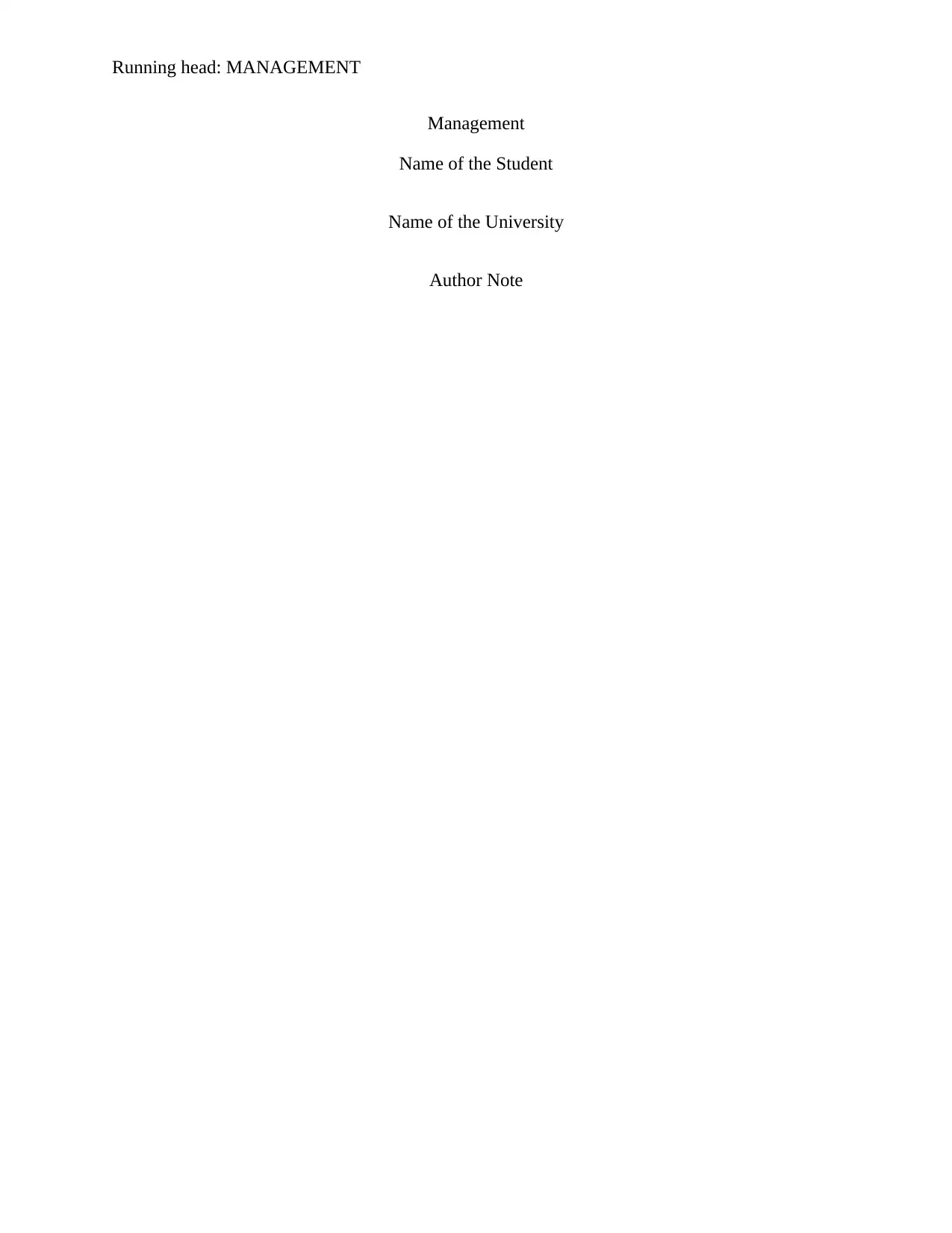
Running head: MANAGEMENT
Management
Name of the Student
Name of the University
Author Note
Management
Name of the Student
Name of the University
Author Note
Paraphrase This Document
Need a fresh take? Get an instant paraphrase of this document with our AI Paraphraser
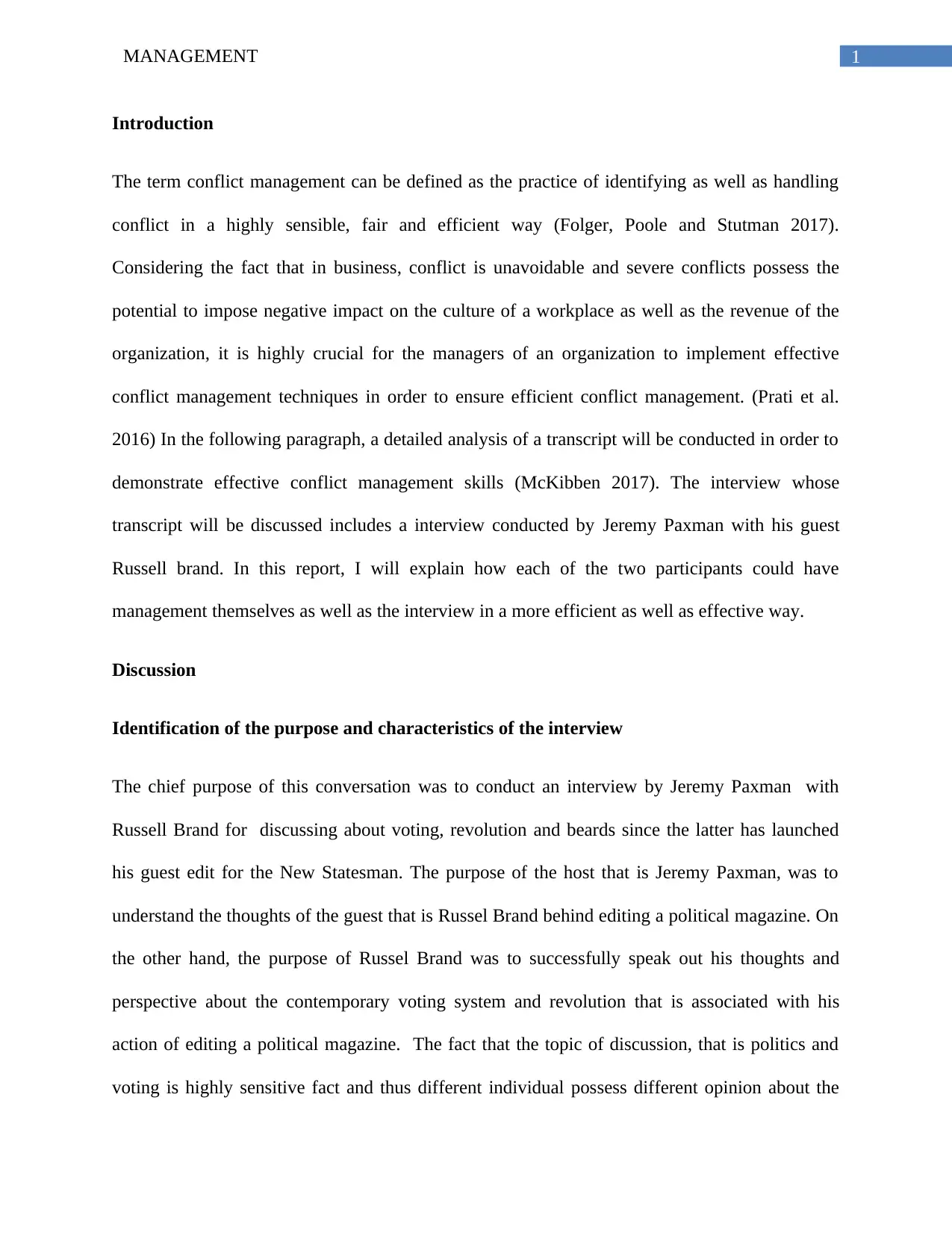
1MANAGEMENT
Introduction
The term conflict management can be defined as the practice of identifying as well as handling
conflict in a highly sensible, fair and efficient way (Folger, Poole and Stutman 2017).
Considering the fact that in business, conflict is unavoidable and severe conflicts possess the
potential to impose negative impact on the culture of a workplace as well as the revenue of the
organization, it is highly crucial for the managers of an organization to implement effective
conflict management techniques in order to ensure efficient conflict management. (Prati et al.
2016) In the following paragraph, a detailed analysis of a transcript will be conducted in order to
demonstrate effective conflict management skills (McKibben 2017). The interview whose
transcript will be discussed includes a interview conducted by Jeremy Paxman with his guest
Russell brand. In this report, I will explain how each of the two participants could have
management themselves as well as the interview in a more efficient as well as effective way.
Discussion
Identification of the purpose and characteristics of the interview
The chief purpose of this conversation was to conduct an interview by Jeremy Paxman with
Russell Brand for discussing about voting, revolution and beards since the latter has launched
his guest edit for the New Statesman. The purpose of the host that is Jeremy Paxman, was to
understand the thoughts of the guest that is Russel Brand behind editing a political magazine. On
the other hand, the purpose of Russel Brand was to successfully speak out his thoughts and
perspective about the contemporary voting system and revolution that is associated with his
action of editing a political magazine. The fact that the topic of discussion, that is politics and
voting is highly sensitive fact and thus different individual possess different opinion about the
Introduction
The term conflict management can be defined as the practice of identifying as well as handling
conflict in a highly sensible, fair and efficient way (Folger, Poole and Stutman 2017).
Considering the fact that in business, conflict is unavoidable and severe conflicts possess the
potential to impose negative impact on the culture of a workplace as well as the revenue of the
organization, it is highly crucial for the managers of an organization to implement effective
conflict management techniques in order to ensure efficient conflict management. (Prati et al.
2016) In the following paragraph, a detailed analysis of a transcript will be conducted in order to
demonstrate effective conflict management skills (McKibben 2017). The interview whose
transcript will be discussed includes a interview conducted by Jeremy Paxman with his guest
Russell brand. In this report, I will explain how each of the two participants could have
management themselves as well as the interview in a more efficient as well as effective way.
Discussion
Identification of the purpose and characteristics of the interview
The chief purpose of this conversation was to conduct an interview by Jeremy Paxman with
Russell Brand for discussing about voting, revolution and beards since the latter has launched
his guest edit for the New Statesman. The purpose of the host that is Jeremy Paxman, was to
understand the thoughts of the guest that is Russel Brand behind editing a political magazine. On
the other hand, the purpose of Russel Brand was to successfully speak out his thoughts and
perspective about the contemporary voting system and revolution that is associated with his
action of editing a political magazine. The fact that the topic of discussion, that is politics and
voting is highly sensitive fact and thus different individual possess different opinion about the
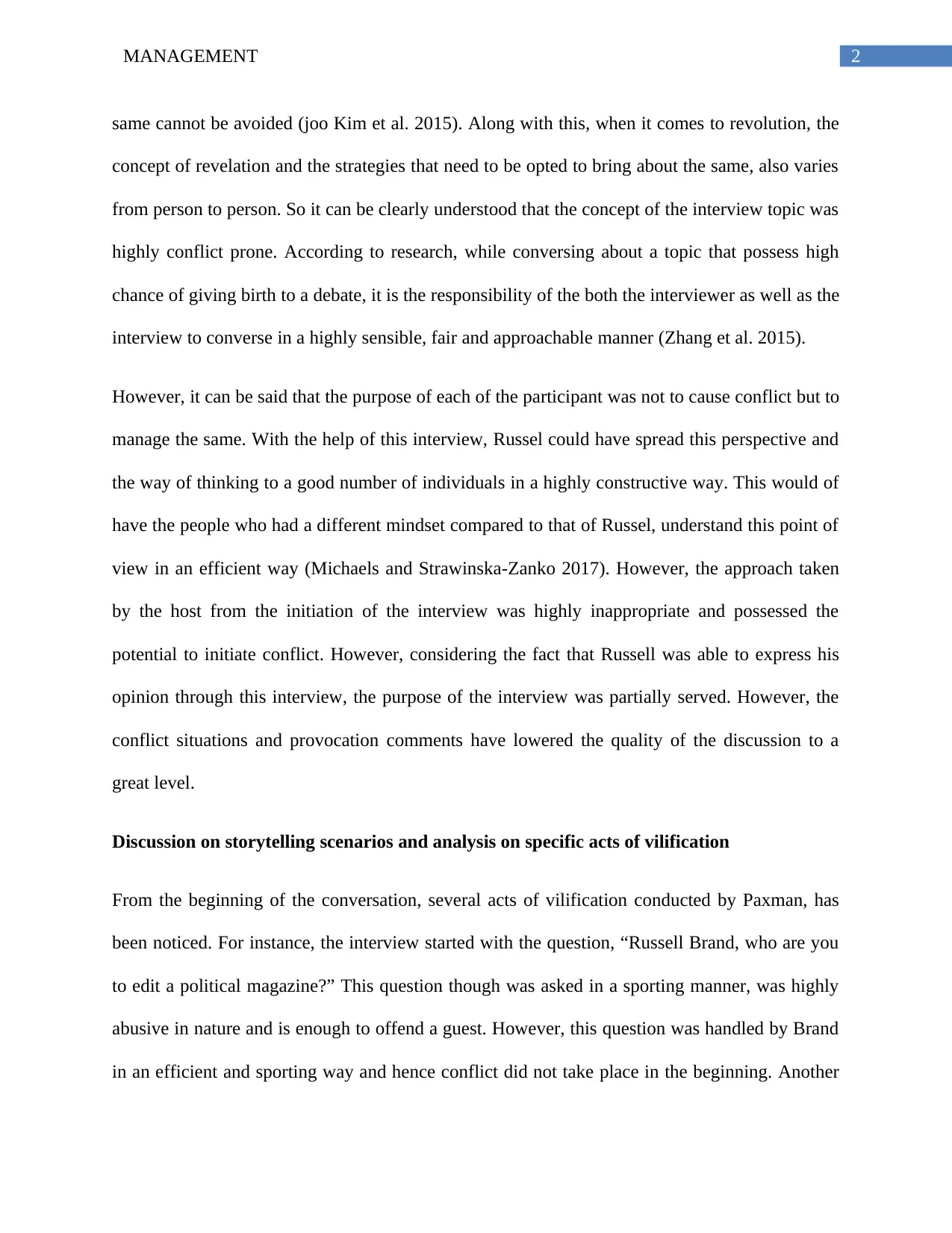
2MANAGEMENT
same cannot be avoided (joo Kim et al. 2015). Along with this, when it comes to revolution, the
concept of revelation and the strategies that need to be opted to bring about the same, also varies
from person to person. So it can be clearly understood that the concept of the interview topic was
highly conflict prone. According to research, while conversing about a topic that possess high
chance of giving birth to a debate, it is the responsibility of the both the interviewer as well as the
interview to converse in a highly sensible, fair and approachable manner (Zhang et al. 2015).
However, it can be said that the purpose of each of the participant was not to cause conflict but to
manage the same. With the help of this interview, Russel could have spread this perspective and
the way of thinking to a good number of individuals in a highly constructive way. This would of
have the people who had a different mindset compared to that of Russel, understand this point of
view in an efficient way (Michaels and Strawinska-Zanko 2017). However, the approach taken
by the host from the initiation of the interview was highly inappropriate and possessed the
potential to initiate conflict. However, considering the fact that Russell was able to express his
opinion through this interview, the purpose of the interview was partially served. However, the
conflict situations and provocation comments have lowered the quality of the discussion to a
great level.
Discussion on storytelling scenarios and analysis on specific acts of vilification
From the beginning of the conversation, several acts of vilification conducted by Paxman, has
been noticed. For instance, the interview started with the question, “Russell Brand, who are you
to edit a political magazine?” This question though was asked in a sporting manner, was highly
abusive in nature and is enough to offend a guest. However, this question was handled by Brand
in an efficient and sporting way and hence conflict did not take place in the beginning. Another
same cannot be avoided (joo Kim et al. 2015). Along with this, when it comes to revolution, the
concept of revelation and the strategies that need to be opted to bring about the same, also varies
from person to person. So it can be clearly understood that the concept of the interview topic was
highly conflict prone. According to research, while conversing about a topic that possess high
chance of giving birth to a debate, it is the responsibility of the both the interviewer as well as the
interview to converse in a highly sensible, fair and approachable manner (Zhang et al. 2015).
However, it can be said that the purpose of each of the participant was not to cause conflict but to
manage the same. With the help of this interview, Russel could have spread this perspective and
the way of thinking to a good number of individuals in a highly constructive way. This would of
have the people who had a different mindset compared to that of Russel, understand this point of
view in an efficient way (Michaels and Strawinska-Zanko 2017). However, the approach taken
by the host from the initiation of the interview was highly inappropriate and possessed the
potential to initiate conflict. However, considering the fact that Russell was able to express his
opinion through this interview, the purpose of the interview was partially served. However, the
conflict situations and provocation comments have lowered the quality of the discussion to a
great level.
Discussion on storytelling scenarios and analysis on specific acts of vilification
From the beginning of the conversation, several acts of vilification conducted by Paxman, has
been noticed. For instance, the interview started with the question, “Russell Brand, who are you
to edit a political magazine?” This question though was asked in a sporting manner, was highly
abusive in nature and is enough to offend a guest. However, this question was handled by Brand
in an efficient and sporting way and hence conflict did not take place in the beginning. Another
⊘ This is a preview!⊘
Do you want full access?
Subscribe today to unlock all pages.

Trusted by 1+ million students worldwide
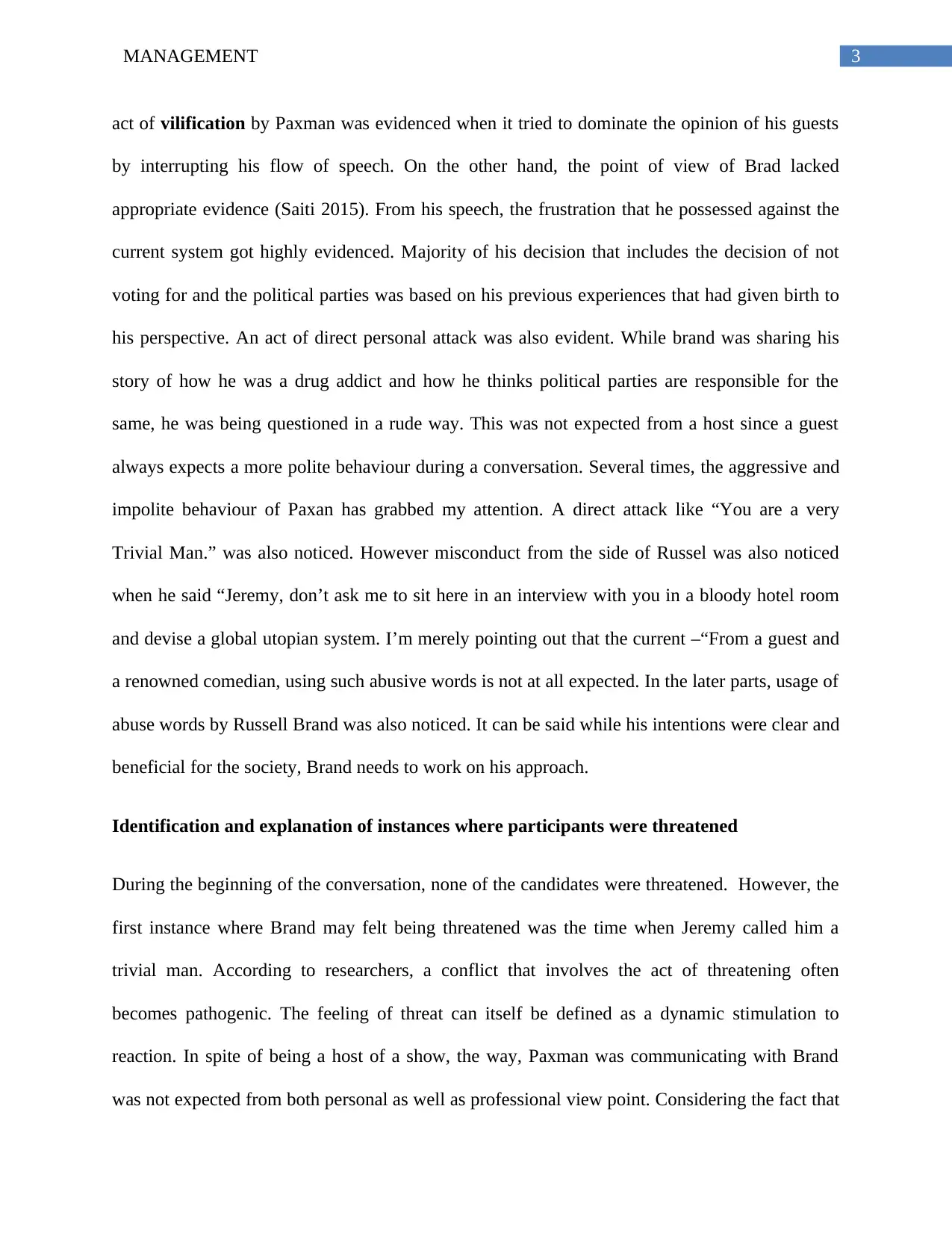
3MANAGEMENT
act of vilification by Paxman was evidenced when it tried to dominate the opinion of his guests
by interrupting his flow of speech. On the other hand, the point of view of Brad lacked
appropriate evidence (Saiti 2015). From his speech, the frustration that he possessed against the
current system got highly evidenced. Majority of his decision that includes the decision of not
voting for and the political parties was based on his previous experiences that had given birth to
his perspective. An act of direct personal attack was also evident. While brand was sharing his
story of how he was a drug addict and how he thinks political parties are responsible for the
same, he was being questioned in a rude way. This was not expected from a host since a guest
always expects a more polite behaviour during a conversation. Several times, the aggressive and
impolite behaviour of Paxan has grabbed my attention. A direct attack like “You are a very
Trivial Man.” was also noticed. However misconduct from the side of Russel was also noticed
when he said “Jeremy, don’t ask me to sit here in an interview with you in a bloody hotel room
and devise a global utopian system. I’m merely pointing out that the current –“From a guest and
a renowned comedian, using such abusive words is not at all expected. In the later parts, usage of
abuse words by Russell Brand was also noticed. It can be said while his intentions were clear and
beneficial for the society, Brand needs to work on his approach.
Identification and explanation of instances where participants were threatened
During the beginning of the conversation, none of the candidates were threatened. However, the
first instance where Brand may felt being threatened was the time when Jeremy called him a
trivial man. According to researchers, a conflict that involves the act of threatening often
becomes pathogenic. The feeling of threat can itself be defined as a dynamic stimulation to
reaction. In spite of being a host of a show, the way, Paxman was communicating with Brand
was not expected from both personal as well as professional view point. Considering the fact that
act of vilification by Paxman was evidenced when it tried to dominate the opinion of his guests
by interrupting his flow of speech. On the other hand, the point of view of Brad lacked
appropriate evidence (Saiti 2015). From his speech, the frustration that he possessed against the
current system got highly evidenced. Majority of his decision that includes the decision of not
voting for and the political parties was based on his previous experiences that had given birth to
his perspective. An act of direct personal attack was also evident. While brand was sharing his
story of how he was a drug addict and how he thinks political parties are responsible for the
same, he was being questioned in a rude way. This was not expected from a host since a guest
always expects a more polite behaviour during a conversation. Several times, the aggressive and
impolite behaviour of Paxan has grabbed my attention. A direct attack like “You are a very
Trivial Man.” was also noticed. However misconduct from the side of Russel was also noticed
when he said “Jeremy, don’t ask me to sit here in an interview with you in a bloody hotel room
and devise a global utopian system. I’m merely pointing out that the current –“From a guest and
a renowned comedian, using such abusive words is not at all expected. In the later parts, usage of
abuse words by Russell Brand was also noticed. It can be said while his intentions were clear and
beneficial for the society, Brand needs to work on his approach.
Identification and explanation of instances where participants were threatened
During the beginning of the conversation, none of the candidates were threatened. However, the
first instance where Brand may felt being threatened was the time when Jeremy called him a
trivial man. According to researchers, a conflict that involves the act of threatening often
becomes pathogenic. The feeling of threat can itself be defined as a dynamic stimulation to
reaction. In spite of being a host of a show, the way, Paxman was communicating with Brand
was not expected from both personal as well as professional view point. Considering the fact that
Paraphrase This Document
Need a fresh take? Get an instant paraphrase of this document with our AI Paraphraser
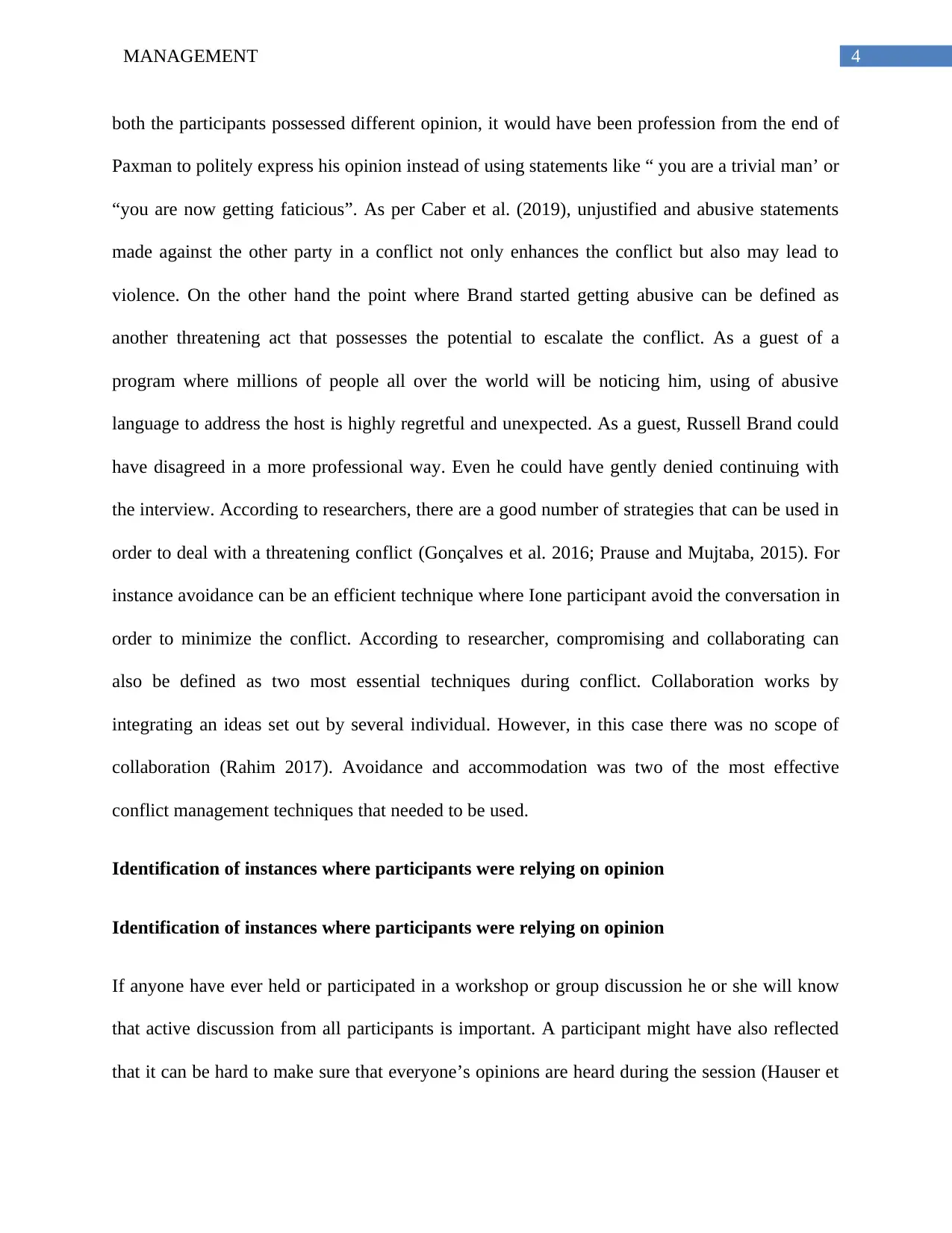
4MANAGEMENT
both the participants possessed different opinion, it would have been profession from the end of
Paxman to politely express his opinion instead of using statements like “ you are a trivial man’ or
“you are now getting faticious”. As per Caber et al. (2019), unjustified and abusive statements
made against the other party in a conflict not only enhances the conflict but also may lead to
violence. On the other hand the point where Brand started getting abusive can be defined as
another threatening act that possesses the potential to escalate the conflict. As a guest of a
program where millions of people all over the world will be noticing him, using of abusive
language to address the host is highly regretful and unexpected. As a guest, Russell Brand could
have disagreed in a more professional way. Even he could have gently denied continuing with
the interview. According to researchers, there are a good number of strategies that can be used in
order to deal with a threatening conflict (Gonçalves et al. 2016; Prause and Mujtaba, 2015). For
instance avoidance can be an efficient technique where Ione participant avoid the conversation in
order to minimize the conflict. According to researcher, compromising and collaborating can
also be defined as two most essential techniques during conflict. Collaboration works by
integrating an ideas set out by several individual. However, in this case there was no scope of
collaboration (Rahim 2017). Avoidance and accommodation was two of the most effective
conflict management techniques that needed to be used.
Identification of instances where participants were relying on opinion
Identification of instances where participants were relying on opinion
If anyone have ever held or participated in a workshop or group discussion he or she will know
that active discussion from all participants is important. A participant might have also reflected
that it can be hard to make sure that everyone’s opinions are heard during the session (Hauser et
both the participants possessed different opinion, it would have been profession from the end of
Paxman to politely express his opinion instead of using statements like “ you are a trivial man’ or
“you are now getting faticious”. As per Caber et al. (2019), unjustified and abusive statements
made against the other party in a conflict not only enhances the conflict but also may lead to
violence. On the other hand the point where Brand started getting abusive can be defined as
another threatening act that possesses the potential to escalate the conflict. As a guest of a
program where millions of people all over the world will be noticing him, using of abusive
language to address the host is highly regretful and unexpected. As a guest, Russell Brand could
have disagreed in a more professional way. Even he could have gently denied continuing with
the interview. According to researchers, there are a good number of strategies that can be used in
order to deal with a threatening conflict (Gonçalves et al. 2016; Prause and Mujtaba, 2015). For
instance avoidance can be an efficient technique where Ione participant avoid the conversation in
order to minimize the conflict. According to researcher, compromising and collaborating can
also be defined as two most essential techniques during conflict. Collaboration works by
integrating an ideas set out by several individual. However, in this case there was no scope of
collaboration (Rahim 2017). Avoidance and accommodation was two of the most effective
conflict management techniques that needed to be used.
Identification of instances where participants were relying on opinion
Identification of instances where participants were relying on opinion
If anyone have ever held or participated in a workshop or group discussion he or she will know
that active discussion from all participants is important. A participant might have also reflected
that it can be hard to make sure that everyone’s opinions are heard during the session (Hauser et
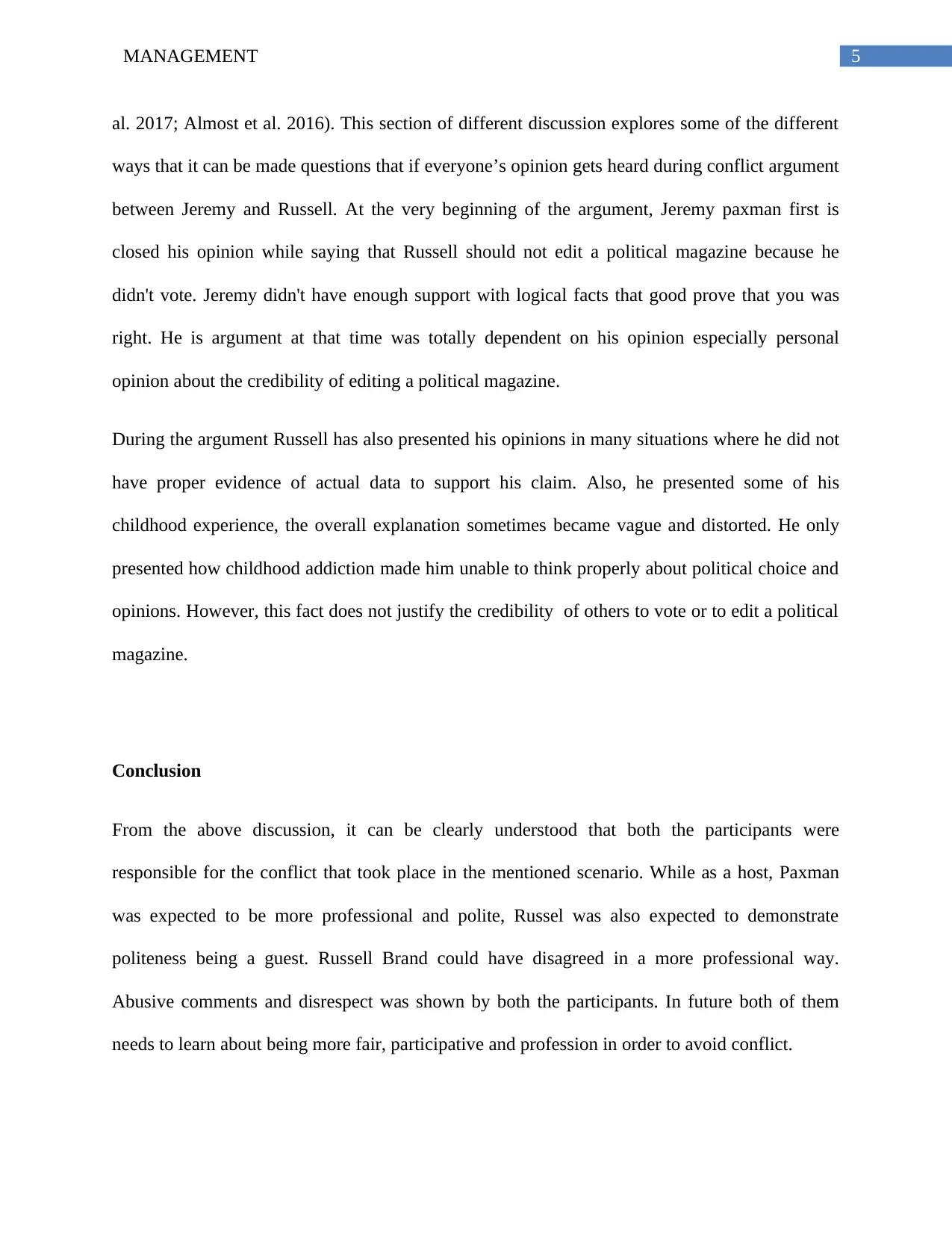
5MANAGEMENT
al. 2017; Almost et al. 2016). This section of different discussion explores some of the different
ways that it can be made questions that if everyone’s opinion gets heard during conflict argument
between Jeremy and Russell. At the very beginning of the argument, Jeremy paxman first is
closed his opinion while saying that Russell should not edit a political magazine because he
didn't vote. Jeremy didn't have enough support with logical facts that good prove that you was
right. He is argument at that time was totally dependent on his opinion especially personal
opinion about the credibility of editing a political magazine.
During the argument Russell has also presented his opinions in many situations where he did not
have proper evidence of actual data to support his claim. Also, he presented some of his
childhood experience, the overall explanation sometimes became vague and distorted. He only
presented how childhood addiction made him unable to think properly about political choice and
opinions. However, this fact does not justify the credibility of others to vote or to edit a political
magazine.
Conclusion
From the above discussion, it can be clearly understood that both the participants were
responsible for the conflict that took place in the mentioned scenario. While as a host, Paxman
was expected to be more professional and polite, Russel was also expected to demonstrate
politeness being a guest. Russell Brand could have disagreed in a more professional way.
Abusive comments and disrespect was shown by both the participants. In future both of them
needs to learn about being more fair, participative and profession in order to avoid conflict.
al. 2017; Almost et al. 2016). This section of different discussion explores some of the different
ways that it can be made questions that if everyone’s opinion gets heard during conflict argument
between Jeremy and Russell. At the very beginning of the argument, Jeremy paxman first is
closed his opinion while saying that Russell should not edit a political magazine because he
didn't vote. Jeremy didn't have enough support with logical facts that good prove that you was
right. He is argument at that time was totally dependent on his opinion especially personal
opinion about the credibility of editing a political magazine.
During the argument Russell has also presented his opinions in many situations where he did not
have proper evidence of actual data to support his claim. Also, he presented some of his
childhood experience, the overall explanation sometimes became vague and distorted. He only
presented how childhood addiction made him unable to think properly about political choice and
opinions. However, this fact does not justify the credibility of others to vote or to edit a political
magazine.
Conclusion
From the above discussion, it can be clearly understood that both the participants were
responsible for the conflict that took place in the mentioned scenario. While as a host, Paxman
was expected to be more professional and polite, Russel was also expected to demonstrate
politeness being a guest. Russell Brand could have disagreed in a more professional way.
Abusive comments and disrespect was shown by both the participants. In future both of them
needs to learn about being more fair, participative and profession in order to avoid conflict.
⊘ This is a preview!⊘
Do you want full access?
Subscribe today to unlock all pages.

Trusted by 1+ million students worldwide
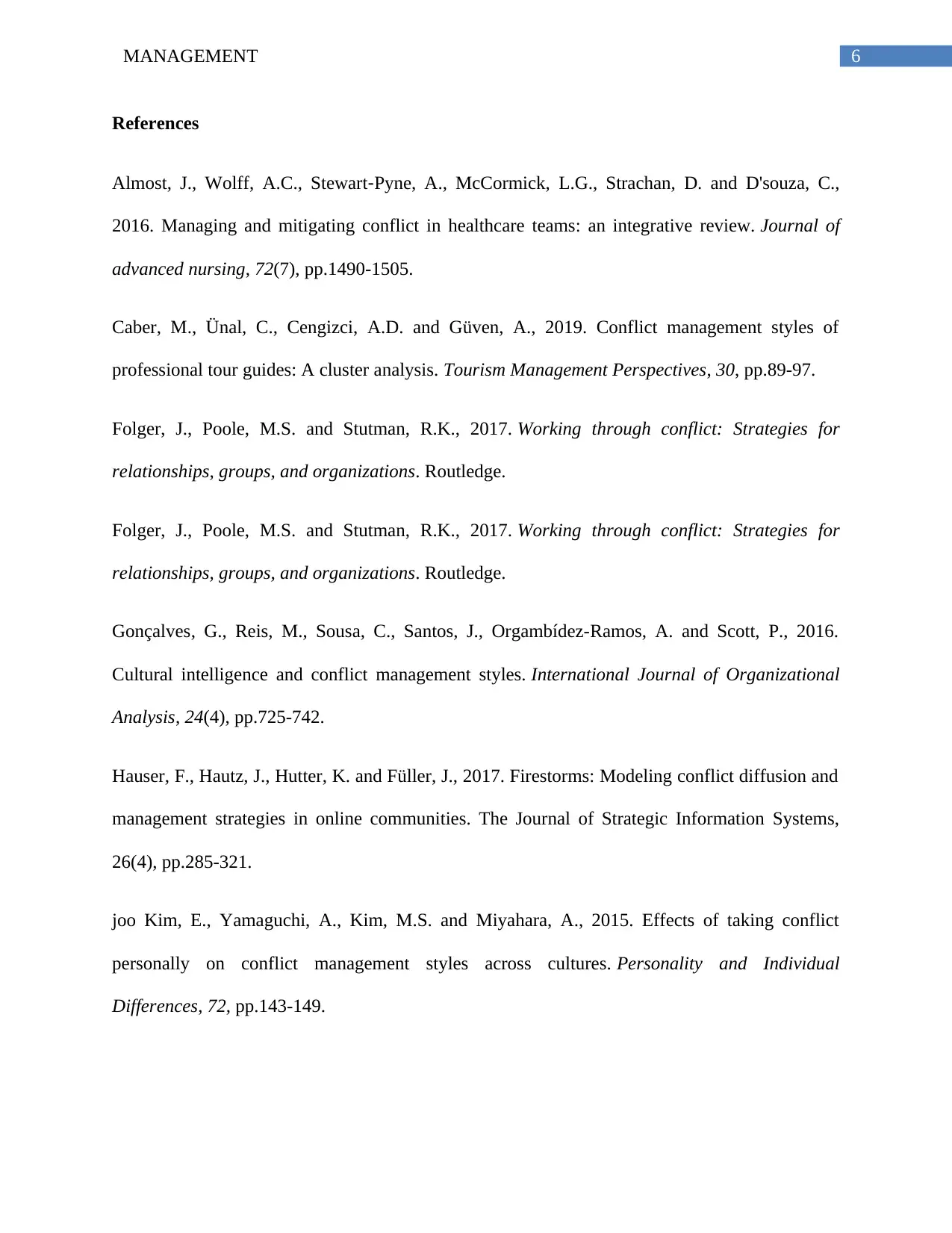
6MANAGEMENT
References
Almost, J., Wolff, A.C., Stewart‐Pyne, A., McCormick, L.G., Strachan, D. and D'souza, C.,
2016. Managing and mitigating conflict in healthcare teams: an integrative review. Journal of
advanced nursing, 72(7), pp.1490-1505.
Caber, M., Ünal, C., Cengizci, A.D. and Güven, A., 2019. Conflict management styles of
professional tour guides: A cluster analysis. Tourism Management Perspectives, 30, pp.89-97.
Folger, J., Poole, M.S. and Stutman, R.K., 2017. Working through conflict: Strategies for
relationships, groups, and organizations. Routledge.
Folger, J., Poole, M.S. and Stutman, R.K., 2017. Working through conflict: Strategies for
relationships, groups, and organizations. Routledge.
Gonçalves, G., Reis, M., Sousa, C., Santos, J., Orgambídez-Ramos, A. and Scott, P., 2016.
Cultural intelligence and conflict management styles. International Journal of Organizational
Analysis, 24(4), pp.725-742.
Hauser, F., Hautz, J., Hutter, K. and Füller, J., 2017. Firestorms: Modeling conflict diffusion and
management strategies in online communities. The Journal of Strategic Information Systems,
26(4), pp.285-321.
joo Kim, E., Yamaguchi, A., Kim, M.S. and Miyahara, A., 2015. Effects of taking conflict
personally on conflict management styles across cultures. Personality and Individual
Differences, 72, pp.143-149.
References
Almost, J., Wolff, A.C., Stewart‐Pyne, A., McCormick, L.G., Strachan, D. and D'souza, C.,
2016. Managing and mitigating conflict in healthcare teams: an integrative review. Journal of
advanced nursing, 72(7), pp.1490-1505.
Caber, M., Ünal, C., Cengizci, A.D. and Güven, A., 2019. Conflict management styles of
professional tour guides: A cluster analysis. Tourism Management Perspectives, 30, pp.89-97.
Folger, J., Poole, M.S. and Stutman, R.K., 2017. Working through conflict: Strategies for
relationships, groups, and organizations. Routledge.
Folger, J., Poole, M.S. and Stutman, R.K., 2017. Working through conflict: Strategies for
relationships, groups, and organizations. Routledge.
Gonçalves, G., Reis, M., Sousa, C., Santos, J., Orgambídez-Ramos, A. and Scott, P., 2016.
Cultural intelligence and conflict management styles. International Journal of Organizational
Analysis, 24(4), pp.725-742.
Hauser, F., Hautz, J., Hutter, K. and Füller, J., 2017. Firestorms: Modeling conflict diffusion and
management strategies in online communities. The Journal of Strategic Information Systems,
26(4), pp.285-321.
joo Kim, E., Yamaguchi, A., Kim, M.S. and Miyahara, A., 2015. Effects of taking conflict
personally on conflict management styles across cultures. Personality and Individual
Differences, 72, pp.143-149.
Paraphrase This Document
Need a fresh take? Get an instant paraphrase of this document with our AI Paraphraser
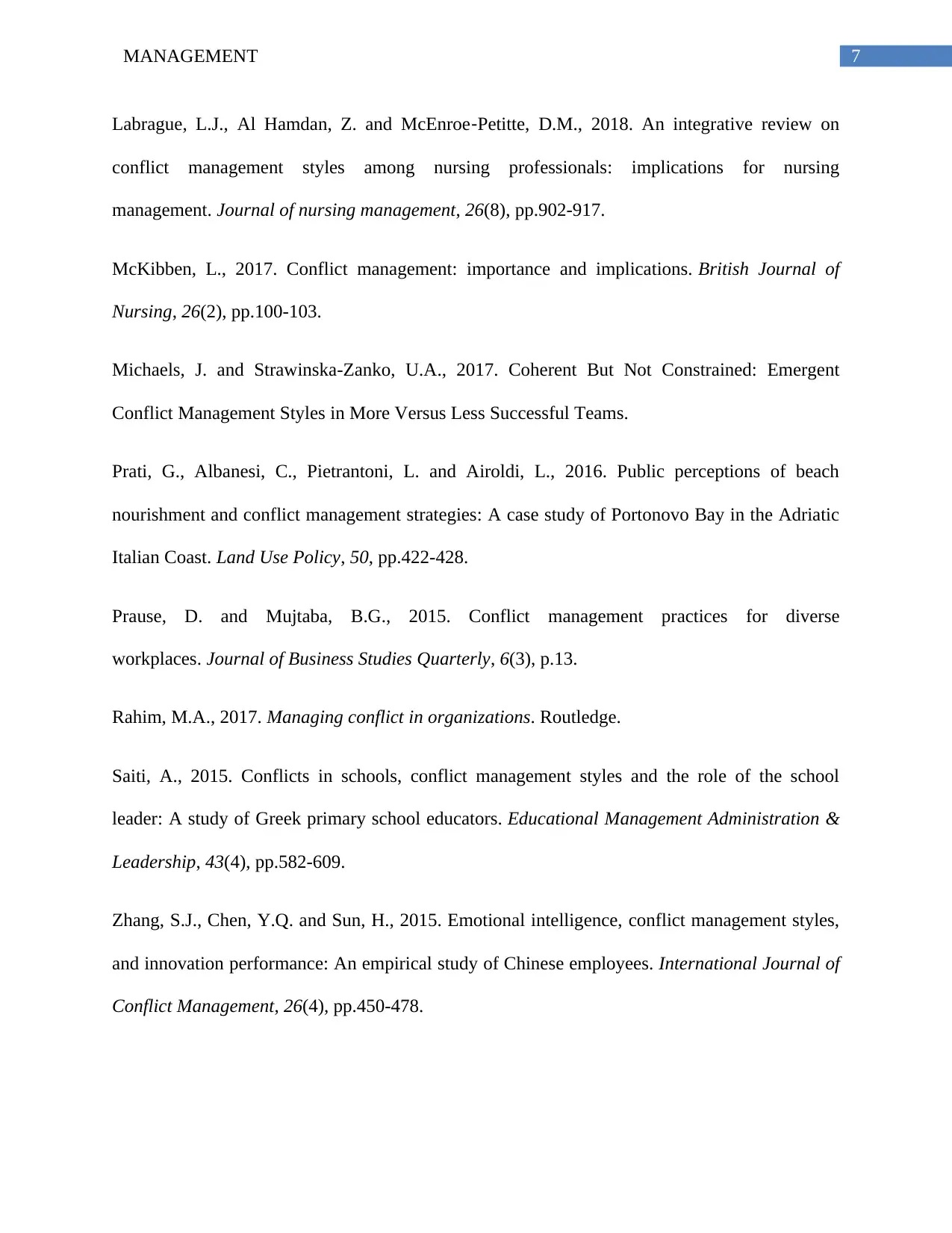
7MANAGEMENT
Labrague, L.J., Al Hamdan, Z. and McEnroe‐Petitte, D.M., 2018. An integrative review on
conflict management styles among nursing professionals: implications for nursing
management. Journal of nursing management, 26(8), pp.902-917.
McKibben, L., 2017. Conflict management: importance and implications. British Journal of
Nursing, 26(2), pp.100-103.
Michaels, J. and Strawinska-Zanko, U.A., 2017. Coherent But Not Constrained: Emergent
Conflict Management Styles in More Versus Less Successful Teams.
Prati, G., Albanesi, C., Pietrantoni, L. and Airoldi, L., 2016. Public perceptions of beach
nourishment and conflict management strategies: A case study of Portonovo Bay in the Adriatic
Italian Coast. Land Use Policy, 50, pp.422-428.
Prause, D. and Mujtaba, B.G., 2015. Conflict management practices for diverse
workplaces. Journal of Business Studies Quarterly, 6(3), p.13.
Rahim, M.A., 2017. Managing conflict in organizations. Routledge.
Saiti, A., 2015. Conflicts in schools, conflict management styles and the role of the school
leader: A study of Greek primary school educators. Educational Management Administration &
Leadership, 43(4), pp.582-609.
Zhang, S.J., Chen, Y.Q. and Sun, H., 2015. Emotional intelligence, conflict management styles,
and innovation performance: An empirical study of Chinese employees. International Journal of
Conflict Management, 26(4), pp.450-478.
Labrague, L.J., Al Hamdan, Z. and McEnroe‐Petitte, D.M., 2018. An integrative review on
conflict management styles among nursing professionals: implications for nursing
management. Journal of nursing management, 26(8), pp.902-917.
McKibben, L., 2017. Conflict management: importance and implications. British Journal of
Nursing, 26(2), pp.100-103.
Michaels, J. and Strawinska-Zanko, U.A., 2017. Coherent But Not Constrained: Emergent
Conflict Management Styles in More Versus Less Successful Teams.
Prati, G., Albanesi, C., Pietrantoni, L. and Airoldi, L., 2016. Public perceptions of beach
nourishment and conflict management strategies: A case study of Portonovo Bay in the Adriatic
Italian Coast. Land Use Policy, 50, pp.422-428.
Prause, D. and Mujtaba, B.G., 2015. Conflict management practices for diverse
workplaces. Journal of Business Studies Quarterly, 6(3), p.13.
Rahim, M.A., 2017. Managing conflict in organizations. Routledge.
Saiti, A., 2015. Conflicts in schools, conflict management styles and the role of the school
leader: A study of Greek primary school educators. Educational Management Administration &
Leadership, 43(4), pp.582-609.
Zhang, S.J., Chen, Y.Q. and Sun, H., 2015. Emotional intelligence, conflict management styles,
and innovation performance: An empirical study of Chinese employees. International Journal of
Conflict Management, 26(4), pp.450-478.
1 out of 8
Related Documents
Your All-in-One AI-Powered Toolkit for Academic Success.
+13062052269
info@desklib.com
Available 24*7 on WhatsApp / Email
![[object Object]](/_next/static/media/star-bottom.7253800d.svg)
Unlock your academic potential
Copyright © 2020–2026 A2Z Services. All Rights Reserved. Developed and managed by ZUCOL.





